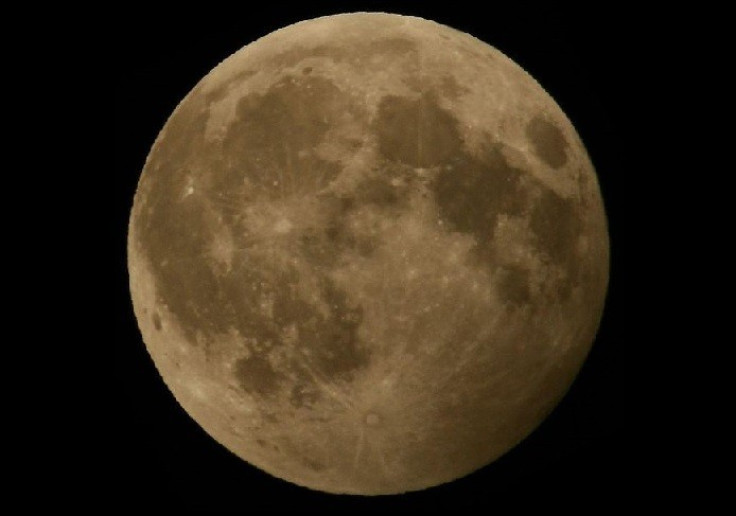Penumbral Lunar Eclipse 2013: Where to Watch the Moon in Earth's Shadow

The final penumbral lunar eclipse will take place tonight (18 October) and stargazers will not have the chance to see the celestial event again until April next year.
A penumbral lunar eclipse takes place when the Sun and Earth align so the moon passes into our planet's penumbra - the wider region of Earth's shadow.
When this happens, the moon will appear darker than normal and will take on a reddish tint. This is because the sun's light is filtered through Earth's atmosphere, which eliminates the 'blue light', leaving only red hues.
In the UK, the lunar eclipse will take place just before midnight and people will have the best view of it than any other place in the world as it occurs when the night's sky is at its darkest.
It will be visible for a few hours as long as the skies are clear. The Met Office is currently forecasting rain for most parts of the UK.
Alan MacRobert, writing for Sky and Telescope magazine, said: "On the evening of Friday, October 18th, the full Moon will glide across the pale outer fringe (penumbra) of Earth's shadow.
"Unusual shading on the southern half of the Moon should be fairly plain. Look for the penumbral shadow to move from (celestial) east to west across the disc. You might be able to detect lesser traces of penumbral shading for about 45 minutes before and after mid-eclipse."
IBTimes UK looks at the best spots to watch the penumbra lunar eclipse:

London:
Stargazing can be difficult in London as like all big cities, the light pollution can distort the view of the night sky. People wishing to see the penumbral lunar eclipse can head to one of the city's parks - Regent's Park and Primrose Hill are used by the Baker Street Irregular Astronomers club.
The WaterWorks Nature Reserve in Lee Valley is also open 24/7 and access is available at the adjacent Golf Centre and Hackney Marsh.
Portsmouth:
Butser Hill is a National Nature Reserve with an observation area that boasts being the highest point in Hampshire. It is just 16 miles from Portsmouth, 19 miles from Winchester and 31 miles from Southampton.
Butser Hill can be reached by the A3 past the Hampshire Hog Pub and it was previously used to host BBC Stargazing Live. According to HantsAstro.org, Butser Hill has "stunning vistas" of the South Coast and is an ideal spot for astro-photography.
Bristol:
Avon Gorge and Downs, on the edge of the city, is open 24/7 and is an ideal spot to watch the lunar eclipse. Parking is also free at The Downs.
The area consists of 440 acres and includes Durdham Down, Clifton Down and Clifton Observatory. Dark Sky Discovery recommends taking safety precautions as there are no street lights on the Downs - it says it is best to always visit with another person.
South Wales:
There are a number of recommended spots for stargazing in South Wales. The Glyncorrwg Ponds near Port Talbot and Swansea can be reached from the J40 for Cwmafan. The ponds were formally coal mines that closed in 1970 that were transformed in the 1990s.
For a spot closer to Cardiff and Newport, Parc Penallta is good place to watch the night sky. The parc has excellent views in all directions as it is exposed on top of a mountain. The entrance to Parc Penallta is midway between Ystrad Mynach and Gelligaer on Penalltau Road.
Birmingham:
Barr Beacon is just 17 miles from Birmingham and is one of the highest points in the West Midlands where visitors can see 11 counties from its peak. The site is open to the public 24 hours but car parks are shut at night if no events are scheduled.
To reach Barr Beacon, there are two bus services from Walsall or drivers can access the area by Beacon road.
Sheffield:
The Peak District offers dark skies to watch the night sky and close to Sheffield, Manchester and Leeds. For people coming from Sheffield, Surprise View is a carpark on the outskirts of Hathersage with panoramic views of the Hope Valley.
Dark Sky Discovery notes there are no lights at the car park and it is important for star gazers to bring a torch as the car park opens onto the A6187.
Newcastle:
Carricks Picnic Area Parkhead Station are both recommended spots for people from Newcastle wishing to watch the penumbral lunar eclipse.
Both spots are between 20 and 30 miles from the city centre. Parkhead Station and Carricks Picnic area both have free car parks open 24 hours per day and are considered areas of outstanding natural beauty by Dark Sky Discovery Sites.
Aberdeen:
People living in Aberdeen can travel around 40 miles to one of the most remote zones in Scotland - The Cabrach, which has no access restrictions and has a tarmac area and grass. The building at the site can also be leased for stargazing events. It can be reached by the A941 from Rhynie.
Belfast
Just over 20 miles from Belfast, the Oxford Island National Nature Reserve is open to pedestrians at all times, although some gates are locked so stargazers are advised to call for further information.
The nature reserve is on the southern shores of the Lough Neagh and is not directly overlooked by streetlights. It hosted a BBC Stargazing event both this year and last.
© Copyright IBTimes 2024. All rights reserved.






